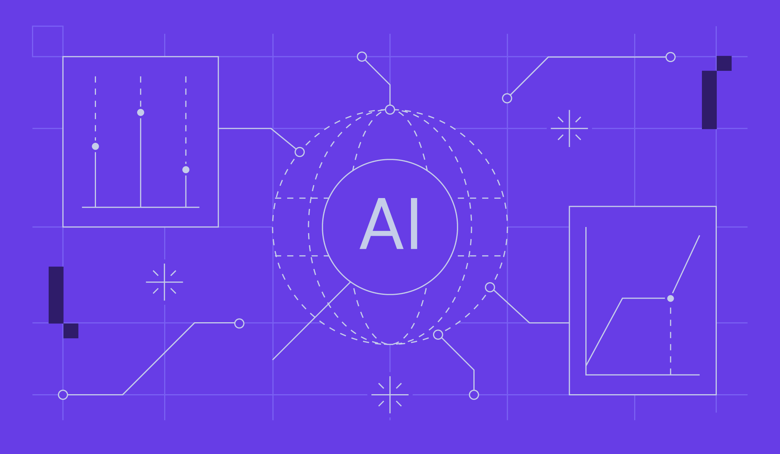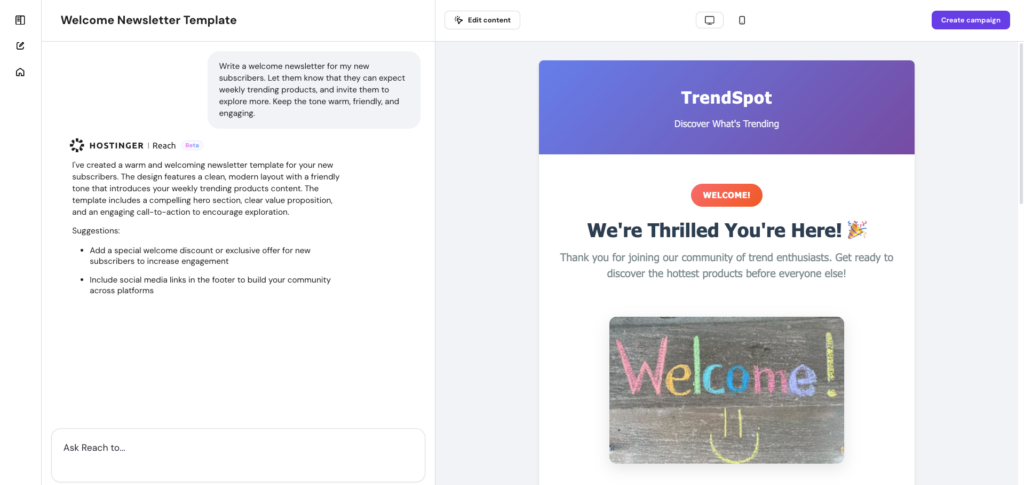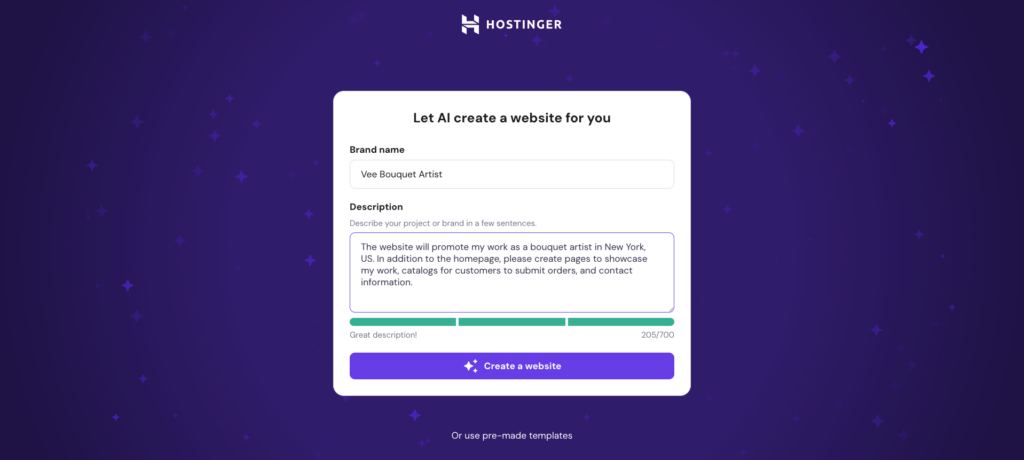Aug 26, 2025
Jordana A. & Dainius K.
7min Read

You don’t need a massive team or a huge budget to take advantage of artificial intelligence (AI). With the right tools, AI can help small businesses automate everyday tasks, boost marketing efforts, streamline operations, and offer faster, more personalized customer support, all while saving time and money.
In this guide, we’ll walk you through practical ways to use AI in your business, highlight the best tools for different needs, and help you navigate common challenges along the way.
Marketing a small business takes time, effort, and often, a full team, which is something many small companies can’t afford. Between creating content, analyzing data, and running campaigns, it’s easy to fall behind.
With the right AI business solutions, you can streamline these processes by automating tasks, processing data into valuable insights, and personalizing outreach. In short: smarter marketing, less manual work, even without a large team or a big marketing budget.
Let’s focus on three areas of small business marketing that benefit from AI: email marketing, content creation, and web development.
Successful email campaigns help you achieve your goals, whether it’s boosting sales, building loyalty, or growing awareness.
Personalization, however, is key to succeeding in email marketing, and AI helps personalize emails at scale by using data like location, behavior, and purchase history. Tools like Mailchimp and GetResponse automatically segment your audience by customer type (new vs returning) or location (local vs international), so you can tailor messages that truly resonate.
Beyond segmentation, AI can automate tasks like A/B testing and sending based on timing or triggers. That means more effective emails with less guesswork and manual tweaking.
Hostinger’s AI email marketing platform, Reach, simplifies the process even further. Just describe your campaign goal and brand tone and Reach generates both content and design, so you can customize or send it instantly. No tech skills or blank page needed.

Content fuels every marketing campaign, but creating it regularly can be a major time sink for small teams.
AI content generators like OpenAI’s GPT-4 and Jasper help speed things up. Just give a prompt, and you’ll get a solid draft in seconds. Polish it up, and you’ve got publish-ready content without spending hours writing from scratch.
They’re especially handy for omnichannel marketing. You can turn a blog post into a newsletter, slice it into social media updates, or rework it into product copy with minimal effort. That means more reach from the same idea.
AI tools are also great for making visuals. They can generate images, graphics, and video snippets that elevate your written content. Since visuals tend to grab more attention, they can boost engagement across the board.
Hostinger’s website-building solutions include pre-built AI content generators. For example, our online website builder features AI Writer for quick text generation.
Building a website used to mean hiring a developer or learning to code, which is far from being ideal for a busy small business owner. Now, AI platforms for web development make it easy to launch a professional site without the steep learning curve.
Tools like Hostinger’s Website Builder use AI to generate custom websites from a simple prompt. Add a drag-and-drop editor and sleek pre-built templates, and you can have your site up and running in no time — no coding required.
It’s also super cost-effective ‒ starting at just $1.99/month.


The same easy flow applies to our AI web app maker, Hostinger Horizons. Simply describe the web app you need and make tweaks through the chat interface ‒ no coding required. Starting at $9.99/month, you get all the features, web hosting, and a free domain for the first year.

Beyond design and development, AI can enhance your website in other ways, whether it’s improving speed, optimizing for SEO, or personalizing the user experience, while keeping visitors engaged and driving conversions. In short, you get a high-performing website without the high effort.
For small businesses, customer experience is everything. A great first impression can turn casual buyers into loyal customers, and AI can help you deliver that at scale.
Let’s look at how AI-powered customer service and sentiment analysis help small businesses offer personalized, timely responses to boost satisfaction and engagement.
AI-powered chatbots offer 24/7 customer support without the cost of a full-time team. Their round-the-clock assistance helps improve customer satisfaction by quickly solving issues during the buying process, potentially boosting driving sales.
AI chatbots also excel at automating common small business customer support tasks. They can handle frequently asked questions, process orders, and even help customers troubleshoot issues, while giving your team more time to focus on complex issues.
Additionally, AI tools can gather and analyze customer feedback to uncover preferences, spot trends, and improve your service over time. Getting started is easy. AI chatbot providers like Tidio and Intercom offer plug-and-play chatbot solutions with built-in automation and analytics.&If you’re tech-savvy and want full control, consider building your own AI support agent with n8n and deploying it on Hostinger’s VPS solutions.

Analyzing how customers feel about your brand, products, or services can be time-consuming and prone to bias. AI streamlines this by quickly analyzing large amounts of data in real-time, delivering accurate insights faster.
For example, AI-powered sentiment analysis tools like MonkeyLearn and Lexalytics analyze feedback from reviews, surveys, and social media, helping small businesses monitor brand perception and make better decisions.
By adding sentiment analysis to your workflow, you can quickly identify what’s working, what’s not, and how to improve your customer experience, product, and marketing efforts.
For small businesses, every saved hour and dollar counts. AI helps by automating repetitive tasks, improving workflows, and delivering insights that support faster, smarter decisions, ultimately reducing operational costs.
Here’s how AI-powered solutions are making processes in key areas like bookkeeping, inventory management, and supply chain operations easier and more affordable.
AI-powered accounting tools simplify financial management by handling tasks like invoicing, expense tracking, and tax calculations — all with fewer errors and less manual work.
Top AI tools for bookkeeping, like QuickBooks and Xero, can automate data entry, sync with your bank, and generate real-time financial reports. You also get features like receipt scanning, sales tax tracking, and bank feed integration to keep your finances organized.
If you’re new to bookkeeping or need help with the basics, our video guide can help you set up a strong foundation. This makes sure your chosen AI tools work more efficiently when you integrate them into your workflow.
AI inventory tools help small businesses predict demand with precision. By analyzing real-time sales data, market trends, and buying patterns, you can avoid overstocking, reduce waste, and keep your cash flow on track.
TradeGecko, NetSuite, and Zoho Inventory monitor stock levels, sales, and purchase orders, and some even sync data across multiple warehouses and automate reordering.
With more intelligent forecasting, you’ll always have the right products at the right time with no lost sales and no money tied up in excess stock.
An efficient supply chain can make or break your business, and AI gives you the tools to stay ahead. From forecasting demand to optimizing delivery routes, AI helps streamline sourcing, inventory, and logistics at every stage.
Different tools cover different needs. For example, Llamasoft specializes in designing and optimizing supply chain operations for maximum profitability, while ShipBob offers order fulfillment and inventory management solutions that streamline small business logistics.
Ultimately, an optimized supply chain cuts operating costs and elevates customer experience.
Integrating AI doesn’t have to be overwhelming. Start small, stay strategic, and scale as you go. Here’s a step-by-step guide:
Already running an online store? Check out our guide on how to use AI in ecommerce for more implementation ideas and tool recommendations.
AI adoption comes with a few common hurdles, but none are deal-breakers if approached strategically.
AI is transforming how small businesses operate, from cutting costs and automating tasks to improving customer service and decision-making. While the trend is clear and adoption is growing, the exact impact will depend on the statistic that you choose to measure the success.
According to the small business statistics:
AI is no longer just for big tech; in fact, it’s becoming a must-have tool for businesses of every size.
At Hostinger, we’re making that transition easy. Our AI-powered tools for web development, content creation, and email marketing are built to be beginner-friendly and budget-conscious. You don’t need a full team or deep pockets, just a clear goal and the right starting point.
All of the tutorial content on this website is subject to Hostinger's rigorous editorial standards and values.